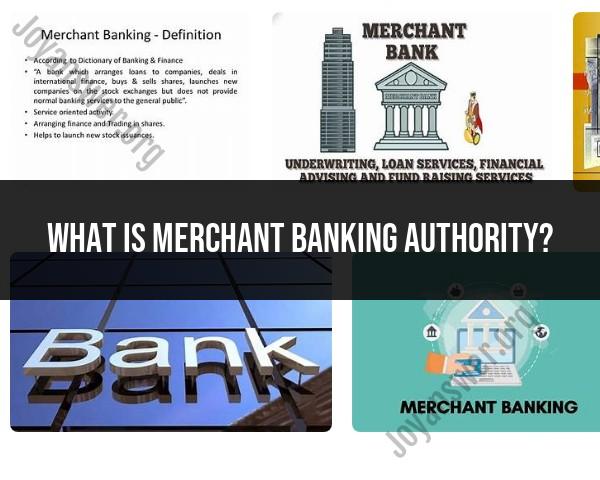What is Merchant Banking Authority?
Merchant banking authority typically refers to the regulatory permission or license required for a financial institution to engage in merchant banking activities. Merchant banking is a specialized form of banking that combines aspects of commercial banking and investment banking. Merchant banks provide a range of financial services to businesses, such as capital raising, advisory services, and investment in businesses. The specific activities and the authority required can vary by country and regulatory framework, but they commonly include:
Capital Raising: Merchant banks assist businesses in raising capital through methods like private placements, initial public offerings (IPOs), and debt offerings. To engage in these activities, they often need authorization from financial regulators.
Advisory Services: They provide advisory services to businesses on mergers and acquisitions (M&A), restructuring, financial strategies, and other corporate finance matters.
Investment in Businesses: Merchant banks may invest their own capital in businesses, taking equity stakes in companies in exchange for providing financial and strategic support.
Underwriting: Some merchant banks underwrite securities, such as stocks and bonds, on behalf of issuing companies. This involves taking on the risk of purchasing these securities and then reselling them to investors.
Risk Management: They may engage in various forms of risk management, including trading financial instruments like derivatives, currencies, and commodities.
Asset Management: Some merchant banks provide asset management services to clients, including the management of investment portfolios.
The specific requirements for merchant banking authority can differ from one jurisdiction to another. In the United States, for instance, the authority to engage in merchant banking activities is regulated by the Securities and Exchange Commission (SEC) and other financial regulatory bodies. In other countries, it may fall under the purview of different regulatory authorities or agencies.
To operate as a merchant bank and offer the services mentioned above, financial institutions often need to meet certain capital adequacy requirements, have experienced personnel, and adhere to specific regulations designed to ensure the safety and soundness of financial markets and the protection of investors and clients.
It's important for institutions interested in engaging in merchant banking activities to consult with the relevant regulatory authorities in their jurisdiction to understand the specific requirements and obtain the necessary licenses or authorizations. The authorization process helps ensure that these activities are conducted in a compliant and transparent manner, which is critical for maintaining the stability and integrity of the financial system.
Understanding Merchant Banking Authority
Merchant banking authority is the ability of a financial institution to engage in merchant banking activities, such as underwriting and investing in equity and debt securities, providing advisory services, and managing private equity and venture capital funds. Merchant banking activities are typically considered to be riskier than traditional banking activities, but they can also be more rewarding.
The Role and Responsibilities of Merchant Banks
Merchant banks play a vital role in the financial system by providing capital and expertise to businesses of all sizes. Merchant banks can help businesses to raise capital for growth and expansion, to acquire other businesses, and to restructure their operations. Merchant banks can also provide businesses with strategic advice and help them to develop new products and services.
Regulatory Frameworks for Merchant Banking
Merchant banking activities are regulated by a variety of financial regulators, depending on the jurisdiction in which the merchant bank is operating. In the United States, merchant banking activities are regulated by the Federal Reserve and the Office of the Comptroller of the Currency.
Advantages of Merchant Banking Services
There are a number of advantages to using merchant banking services, including:
- Access to capital: Merchant banks can provide businesses with access to capital that they may not be able to obtain from traditional banks.
- Expertise: Merchant banks have a deep understanding of the financial markets and can provide businesses with expert advice on a variety of financial matters.
- Relationships: Merchant banks have a network of relationships with investors and other businesses, which can be beneficial to their clients.
Leveraging Merchant Banking for Financial Success
Businesses can leverage merchant banking services to achieve their financial goals by:
- Raising capital for growth and expansion: Merchant banks can help businesses to raise capital for growth and expansion through a variety of methods, such as underwriting equity and debt securities, and syndicating loans.
- Acquiring other businesses: Merchant banks can help businesses to acquire other businesses by providing financial advice and assistance with the acquisition process.
- Restructuring operations: Merchant banks can help businesses to restructure their operations by providing financial advice and assistance with the restructuring process.
- Developing new products and services: Merchant banks can help businesses to develop new products and services by providing financial advice and assistance with the development process.
Overall, merchant banking can be a valuable tool for businesses of all sizes to achieve their financial goals.
Here are some additional tips for leveraging merchant banking for financial success:
- Choose the right merchant bank: It is important to choose a merchant bank that has experience and expertise in the industry in which your business operates.
- Be clear about your goals: Before you approach a merchant bank, be clear about your financial goals and what you hope to achieve.
- Be prepared to provide information about your business: Merchant banks will need to know about your business's financial performance, management team, and future plans in order to assess your needs.
- Be willing to work with the merchant bank: Merchant banks are partners, and it is important to be willing to work with them to achieve your financial goals.
By following these tips, you can leverage merchant banking services to achieve your financial goals and grow your business.












